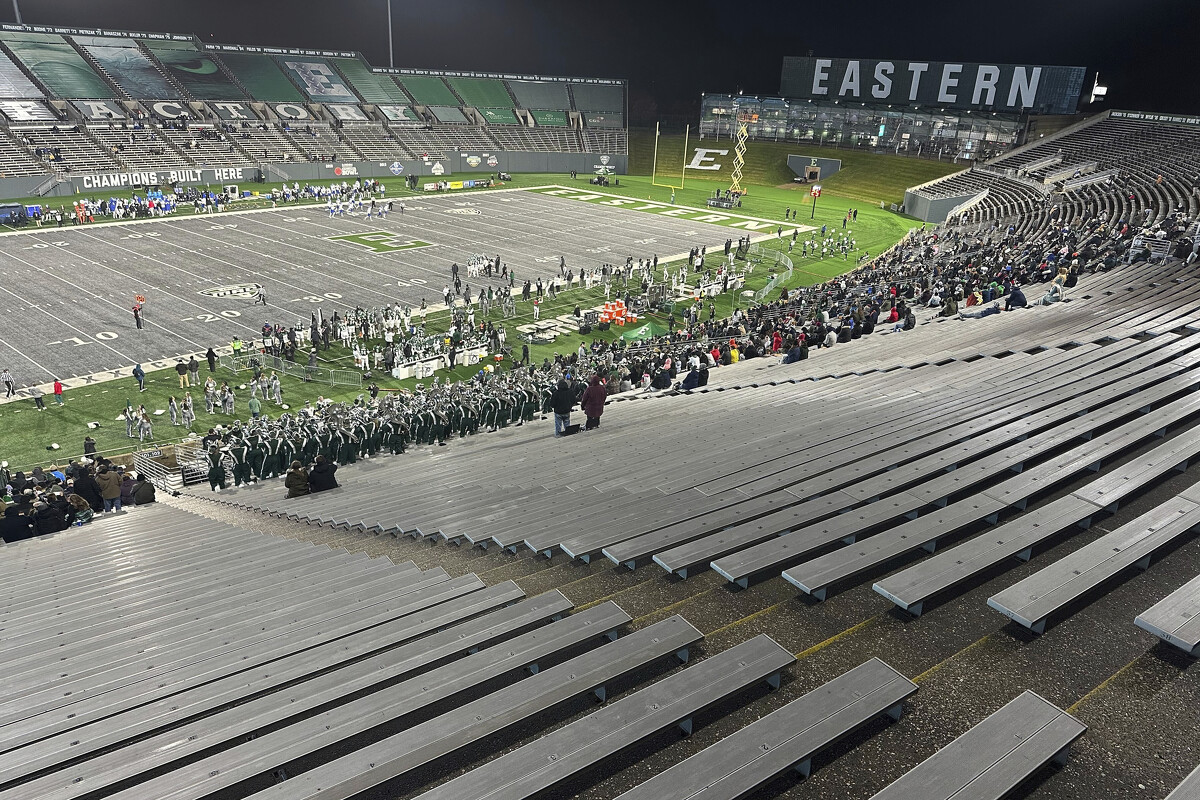
Fans in sparsely filled stands watch Buffalo play Eastern Michigan in a Mid-American Conference football game at Rynearson Stadium, Wednesday, Nov. 11, 2024, in Ypsilanti, Mich. (AP Photo/Larry Lage)
YPSILANTI, Mich. (AP) - On a damp Wednesday night with temperatures dipping into the 30s, fans in sparsely filled stands bundled up to watch Buffalo beat Eastern Michigan 37-30 on gray turf.
The lopsided game was not particularly notable, but it was played on one of the nights the Mid-American Conference has made its own: A weeknight.
"A lot of the general public thinks we play all of our games on Tuesdays and Wednesdays, not just some of them in November," MAC Commissioner Jon Steinbrecher said in a telephone interview this week. "What it has done is help take what was a pretty darned good regional conference and has given it a national brand and made it a national conference."
When the conference has played football games on ESPN or ESPN2 over the last two seasons, the linear television audience has been 10 times larger than when conference schools meet on Saturdays and get lost in the shuffle when viewers have many more choices.
The most-watched MAC game over the last two years was earlier this month on a Wednesday night when Northern Illinois won at Western Michigan and there were 441,600 viewers, a total that doesn't include streaming that isn't captured by Nielsen company.
During the same span, the linear TV audience has been no larger than 46,100 to watch two MAC teams play on Saturdays.
"Having the whole nation watching on Tuesday and Wednesday night is a huge deal for the MAC," Eastern Michigan tight end Jere Getzinger said. "Everybody wants to watch football so if you put it on TV on a Tuesday or Wednesday, people are going to watch."
ESPN has carried midweek MAC football games since the start of the century. ESPN and the conference signed a 13-year extension a decade ago that extends their relationship through at least the 2026-27 season.
The conference has made the most of the opportunities, using MACtion as a tag on social media for more than a decade and it has become a catchy marketing term for the Group of Five football programs that usually operate under the radar in Michigan, Ohio, Indiana, Illinois and New York.
Attendance does tend to go down with weeknight games, keeping some students out of stadiums because they have class or homework and leading to adults staying away home because they have to work the next morning.
"The tradeoff is the national exposure," Buffalo coach Pete Lembo said. "You know November nights midweek the average fan is going to park on the couch, have a bowl of chips and salsa out in front, and watch the game from there."
When the Bulls beat Ball State 51-48 in an overtime thriller on a Tuesday night earlier this month, the announced attendance was 12,708 and that appeared to be generous. There were many empty seats after halftime.
"You watch the games on TV, the stadiums all look like this," Buffalo fan Jeff Wojcicki said. "They are not packed, but it's the only game on, and you know where to find it."
Sleep and practice schedules take a hit as well, creating another wave of challenges for students to attend class and coaches to prepare without the usual rhythm of preparing all week to play on Saturday.
"Last week when we played at Ohio in Athens, we had a 4-four bus ride home and got home at about 3:30 a.m.," Eastern Michigan center Broderick Roman said. "We still had to go to class and that was tough, but it's part of what you commit to as an athlete."
That happens a lot in November when the MAC shifts its unique schedule. During the first two weeks of the month, the conference had 10 games on Tuesdays and Wednesdays exclusively.
This week, there were five games on Tuesday and Wednesday while only one was left in the traditional Saturday slot with Ball State hosting Bowling Green.
Next week, Toledo plays at Akron and Kent State visits Buffalo on Tuesday night before the MAC schedule wraps up with games next Friday and Saturday to determine which teams will meet in the conference title game on Dec. 7 in Detroit.
In all, MAC teams will end up playing about 75% of their games on a Saturday and the rest on November weeknights.
When the Eagles wrapped up practice earlier this week, two days before they played the Bulls, tight end Jere Getzinger provided some insight into the effects of the scheduling quirk.
"It's Monday, but for us it's like a Thursday," he said.
Bowling Green coach Scot Loeffler said he frankly has a hard time remembering what day it is when the schedule shift hits in November.
"The entire week gets turned upside down," Loeffler said. "It's wild, but it's great for the league because there's two days a week this time of year that people around the country will watch MAC games."
---
AP freelance writer Jonah Bronstein contributed to this report.